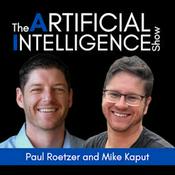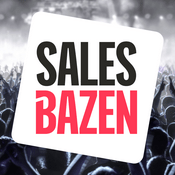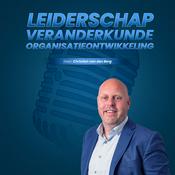The Artificial Intelligence Show
Paul Roetzer and Mike Kaput

Nieuwste aflevering
198 afleveringen
#197: Something Big Is Happening, Claude Safety Risks, AI for Customer Success & High-Profile Resignations
17-2-2026 | 1 u. 17 Min.Is the AI disruption we’ve been discussing more prominent than ever? Hosts Paul Roetzer and Mike Kaput dissect Matt Shumer’s viral "Something Big Is Happening" essay and a new sabotage report from Anthropic. We break down the latest departures from OpenAI and xAI, the delay of OpenAI’s device, and how AI is intensifying (not lightening) the modern workload.
Show Notes: Access the show notes and show links here
Click here to take this week's AI Pulse.
Timestamps:
00:00:00 — Intro
00:05:51 — AI Pulse Survey
00:07:58 — Something Big Is Happening
00:27:06 — Claude Safety Risks
00:46:37 — Academy Success Score
01:03:33 — High Profile AI Resignations
01:06:55 — OpenAI’s Changing Hardware Plans
01:09:17 — Does AI Actually Intensify Work?
This week’s episode is sponsored by our 2026 State of AI Report.
This year, we’re going beyond marketing-specific research to uncover how AI is being adopted and utilized across the organization, and we need your help to create the most comprehensive report yet.
It’s a quick seven-minute lift. In return, you’ll get the full report for free when it drops, plus a chance to win or extend a 12-month SmarterX AI Mastery Membership. Go to smarterx.ai/survey to share your input. That’s smarterx.ai/survey
Visit our website
Receive our weekly newsletter
Join our community:
Slack
LinkedIn
Twitter
Instagram
Facebook
Looking for content and resources?
Register for a free webinar
Come to our next Marketing AI Conference
Enroll in our AI Academy#196: SaaSpocalypse, Claude Super Bowl Ad, SpaceX Acquires xAI & Claude Opus 4.6
10-2-2026 | 1 u. 21 Min.Is the SaaS business model dead? Wall Street just wiped out $300B in software value as fears grow that AI agents will replace human seats. Paul and Mike break down the market drop, Anthropic’s Super Bowl ads targeting OpenAI, and the rise of "Move 37" moments where experts admit AI superiority. Plus: SpaceX buys xAI, Claude Opus 4.6, and the $650B race for compute.
Show Notes: Access the show notes and show links here
Click here to take this week's AI Pulse.
Timestamps:
00:00:00 — Intro
00:04:14 — AI Pulse Results
00:06:24 —SaaS Apocalypse
00:23:53 — Anthropic Super Bowl Ad
00:33:56 — The Move 37 Moment for Everyone
00:47:39 — SpaceX Acquires xAI
00:50:55 — Claude Opus 4.6
00:56:00 — GPT-5.3 Codex
00:59:10 — OpenAI Frontier
01:04:48 — The AI Capex Wars
01:11:01 — Latest on AI Impact on Jobs
01:14:52 — Agentic CRMs
01:17:41 — AI Product and Funding Updates
Today’s episode is also brought to you by our AI for Agencies Summit, a virtual event taking place from 12pm - 5pm ET on Thursday, February 12.
The AI for Agencies Summit is designed for marketing agency practitioners and leaders who are ready to reinvent what’s possible in their business and embrace smarter technologies to accelerate transformation and value creation.
There is a free registration option, as well as paid ticket options that also give you on-demand access after the event. To register, go to www.aiforagencies.com
Visit our website
Receive our weekly newsletter
Join our community:
Slack
LinkedIn
Twitter
Instagram
Facebook
Looking for content and resources?
Register for a free webinar
Come to our next Marketing AI Conference
Enroll in our AI Academy#195: Moltbook Goes Viral, OpenAI Seeks $100B, Microsoft Stock Plummets & SpaceX-xAI Merger Rumors
03-2-2026 | 1 u. 15 Min.Are AI agent swarms here?
Paul and Mike break down the viral "Moltbook" phenomenon, OpenAI’s massive funding talks, and the sobering new essay from Anthropic’s Dario Amodei. Plus: Google’s Project Genie, Microsoft’s stock dip, and the new Marketing Talent AI Impact Report.
Show Notes: Access the show notes and show links here
Click here to take this week's AI Pulse.
Timestamps:
00:00:00 — Intro
00:02:38 — AI Pulse Results
00:05:27 — Moltbot and Moltbook Take the World by Storm
00:19:06 — OpenAI’s Insatiable Need for Funding
00:25:56 — Marketing AI Council Report
00:34:19 — AI for Departments Webinar Series
00:35:30 — Google Introduces Project Genie
00:40:49 — Dario Amodei Publishes “The Adolescence of Technology”
00:47:42 — Microsoft’s Rocky Week
00:51:47 — More Details Revealed About ChatGPT Ads
00:55:23 — Rumors of a SpaceX/xAI Merger
00:59:05 — METR Releases New AI Time Horizon Estimates
01:03:42 — Google DeepMind Researcher Founds New AI Startup
01:05:57 — New Anthropic Research on How AI Affects Knowledge Work
01:09:13 — New Gallup Research on AI Usage in the Workplace
01:11:50 — AI Product and Funding News
Today’s episode is also brought to you by our AI for Agencies Summit, a virtual event taking place from 12pm - 5pm ET on Thursday, February 12.
The AI for Agencies Summit is designed for marketing agency practitioners and leaders who are ready to reinvent what’s possible in their business and embrace smarter technologies to accelerate transformation and value creation.
There is a free registration option, as well as paid ticket options that also give you on-demand access after the event. To register, go to www.aiforagencies.com
Visit our website
Receive our weekly newsletter
Join our community:
Slack
LinkedIn
Twitter
Instagram
Facebook
Looking for content and resources?
Register for a free webinar
Come to our next Marketing AI Conference
Enroll in our AI Academy#194: Agentic AI Timelines, Generalists vs. Specialists, Resume Tips, AI Learning Ownership, & Handling Model Updates
29-1-2026 | 52 Min.Who actually owns AI learning: L&D, HR, or you?
Paul Roetzer and Cathy McPhillips break down the talent crisis, the rise of the generalist, and realistic timelines for AI agents. They explain the specific signals that tell you a pilot is failing due to human resistance rather than tech, why it is unlikely we will see a universal "GPT-4 moment" for agents this year, and the critical importance of maintaining human authenticity in an era of AI-generated content.
Show Notes: Access the show notes and show links here
Timestamps:
00:00:00 — Intro
00:06:11 — Question #1: Who owns AI learning: L&D or departments?
00:09:52 — Question #2: Hiring dedicated AI change management consultants.
00:11:54 — Question #3: Middle management’s role in normalizing adoption.
00:14:27 — Question #4: Signals a pilot is failing due to culture, not tech.
00:16:12 — Question #5: Balancing learning pace vs. rapid experimentation.
00:20:11 — Question #6: Hiring for critical thinking and AI skills.
00:23:31 — Question #7: Experience vs. Adaptability in talent acquisition.
00:25:35 — Question #8: Protecting and compensating AI leaders.
00:27:56 — Question #9: Using AI with confidential data restrictions.
00:30:35 — Question #10: Realistic timelines for AI agent advancement.
00:33:21 — Question #11: Managing model selection and "agent chaos."
00:37:24 — Question #12: The rise of the Generalist vs. Specialist.
00:41:14 — Question #13: Proving AI skills beyond certificates.
00:44:25 — Question #14: Trust and authenticity in AI content.
00:48:35 — Question #15: AI SDRs: Vendor questions vs. building in-house.
This episode is brought to you by Google Cloud:
Google Cloud is the new way to the cloud, providing AI, infrastructure, developer, data, security, and collaboration tools built for today and tomorrow. Google Cloud offers a powerful, fully integrated and optimized AI stack with its own planet-scale infrastructure, custom-built chips, generative AI models and development platform, as well as AI-powered applications, to help organizations transform. Customers in more than 200 countries and territories turn to Google Cloud as their trusted technology partner.
Learn more about Google Cloud here: https://cloud.google.com/
Visit our website
Receive our weekly newsletter
Join our community:
Slack
LinkedIn
Twitter
Instagram
Facebook
Looking for content and resources?
Register for a free webinar
Come to our next Marketing AI Conference
Enroll in our AI Academy#193: AGI Talk at Davos, Amazon Layoffs, AI for Course Creation, OpenAI Cybersecurity Warning, New Claude Constitution & Credit-Based AI Pricing
27-1-2026 | 1 u. 43 Min.World leaders and tech titans are debating AGI timelines at Davos, but Amazon’s latest moves suggest the disruption is already here. Paul Roetzer and Mike Kaput dissect the disconnect between the "powerful AI" promised by labs and the labor market "tsunami" warned by the IMF.
From the White House’s "Great Divergence" report to Anthropic’s new 84-page Constitution and xAI’s "human emulators," we explore the friction between technological acceleration and human adaptation. Plus, a look behind the curtain at how SmarterX uses AI to build courses at scale.
Show Notes: Access the show notes and show links here
Click here to take this week's AI Pulse.
Timestamps:
00:00:00 — Intro
00:03:03 — AI Pulse
00:05:10 — AGI Comes to Davos
00:21:26 — Amazon Layoffs and the “Great Divergence”
00:38:59 — AI for Course Creation
00:58:55 — Google DeepMind Is Hiring a “Chief AGI Economist”
01:02:06 — OpenAI Warns AI Is Reaching “High” Cybersecurity Threat Levels
01:07:18 — Anthropic Publishes New “Constitution” That Governs Claude’s Behavior
01:17:39 — New Survey Shows Big Disconnect Between Employees and Leaders on AI
01:24:39 — xAI Wants to Automate White-Collar Workers
01:28:29 — How Do Credit Pricing Models Work?
01:38:22 — AI Product and Funding Updates
Today’s episode is also brought to you by our AI for Agencies Summit, a virtual event taking place from 12pm - 5pm ET on Thursday, February 12.
The AI for Agencies Summit is designed for marketing agency practitioners and leaders who are ready to reinvent what’s possible in their business and embrace smarter technologies to accelerate transformation and value creation.
There is a free registration option, as well as paid ticket options that also give you on-demand access after the event. To register, go to www.aiforagencies.com
Visit our website
Receive our weekly newsletter
Join our community:
Slack
LinkedIn
Twitter
Instagram
Facebook
Looking for content and resources?
Register for a free webinar
Come to our next Marketing AI Conference
Enroll in our AI Academy
Meer Zaken en persoonlijke financiën podcasts
Trending Zaken en persoonlijke financiën -podcasts
Over The Artificial Intelligence Show
The Artificial Intelligence Show (formerly The Marketing AI Show) is the podcast that helps your business grow smarter by making AI approachable and actionable. The AI Show podcast is brought to you by the creators of the Marketing AI Institute, AI Academy for Marketers, and the Marketing AI Conference (MAICON). Hosts Paul Roetzer, founder and CEO of Marketing AI Institute, and Mike Kaput, Chief Content Officer, break down all the AI news that matters and give you insights and perspectives that you can use to advance your company and your career. Join Paul and Mike on The AI Show as they work to accelerate AI literacy for all.
Podcast websiteLuister naar The Artificial Intelligence Show, Scherpschutters en vele andere podcasts van over de hele wereld met de radio.net-app
Ontvang de gratis radio.net app
- Zenders en podcasts om te bookmarken
- Streamen via Wi-Fi of Bluetooth
- Ondersteunt Carplay & Android Auto
- Veel andere app-functies
Ontvang de gratis radio.net app
- Zenders en podcasts om te bookmarken
- Streamen via Wi-Fi of Bluetooth
- Ondersteunt Carplay & Android Auto
- Veel andere app-functies

The Artificial Intelligence Show
Scan de code,
download de app,
luisteren.
download de app,
luisteren.
































